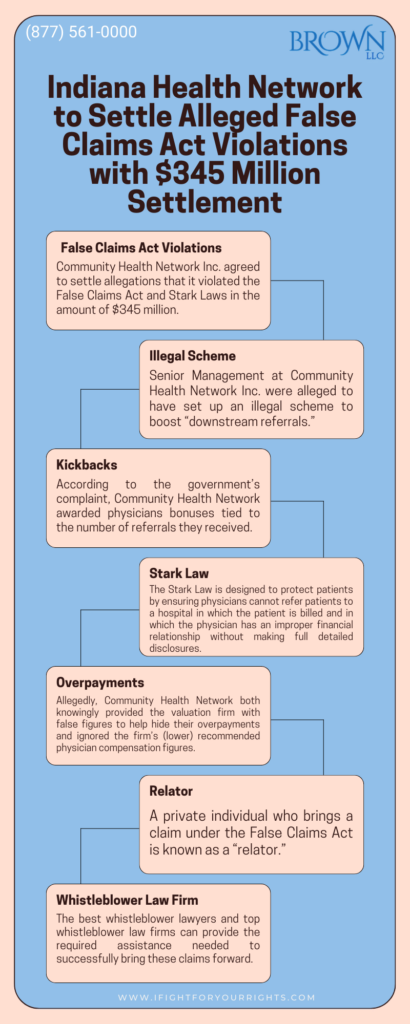Indiana Health Network to Settle Alleged False Claims Act Violations with $345 Million Settlement

Violations of the False Claims Act can lead to substantial recoveries with large whistleblower rewards for those who report fraud. A health network headquartered in Indianapolis called Community Health Network Inc. agreed to settle allegations that it violated the False Claims Act and Stark Laws in the amount of $345 million. Under the False Claims Act, whistleblowers are eligible to recover anywhere from fifteen percent (15%) to thirty percent (30%) of the amount the government successfully recovers in a case as a False Claims Act whistleblower award. Here, the Stark Law whistleblower may have received as much as $100 million in whistleblower rewards by bringing this case to the attention of the Department of Justice in the right way. False Claims Act cases are complex and require the best whistleblower lawyers and whistleblower law firms to successfully pursue a claim.
Community Health Network Inc.’s Alleged Violations
Community Health Network’s alleged violations began in 2008. Senior Management at Community Health Network Inc. were alleged to have set up an illegal scheme to boost “downstream referrals.” According to the government’s complaint, Community Health Network awarded physicians with bonuses tied to the number of referrals they received. Community Health Network was able to pay cardiologists, cardiothoracic surgeons, vascular surgeons, neurosurgeons, and breast surgeons salaries that were significantly higher than market value – sometimes, even as much as double as what they were making in private practice.
The Role of the Stark Law
Although the False Claims Act can encompass any fraudulent claim presented for payment to federal government in any sector, healthcare providers must remain compliant with other laws that regulate their compensation practices. One such law is known as the Stark Law. Generally speaking, the Stark Law is designed to protect patients by ensuring physicians cannot refer patients to a hospital in which the patient is billed and in which the physician has an improper financial relationship with the hospital without making full detailed disclosures. The Stark Law requires referrals to be based on fair market value and precludes physician compensation from considering the volume of referrals made to the hospital by that physician. This would create either an actual conflict of interest between the financial interests of the physician and the duty of the physician to provide the best possible care when taking care of their patients or the appearance of a conflict and would undermine the medical decisions made when one could later question whether the referral was for the benefit of the patient or the provider if they’re receiving additional compensation from the referral.
The Alleged Violation of “Fair Market Value” Provisions
Community Health Network was aware of the Stark Law fair market value concept. To help bolster their case of Stark Law violations, the Department of Health and Human Services – Office of the Attorney General provided evidence indicating Community Health Network ignored valuation firm’s compensation recommendations. Allegedly, Community Health Network both knowingly provided the valuation firm with false figures to help hide their overpayments and ignored the firm’s (lower) recommended physician compensation figures. Often times the cover up is the indicia of the scienter needed to build a False Claims Act case.
Speak with the Lawyers at Brown, LLC Today!
Over 100 million in judgments and settlements trials in state and federal courts. We fight for maximum damage and results.
The Importance of the Whistleblower
With a country as large as the United States, it’s virtually impossible for the government to rely on its own information to determine when it’s being defrauded. The goal of the False Claims Act was to incentivize well-placed individuals to come forth with information that the government can use to successfully bring a suit against organizations engaged in fraudulent activity. In the case of Community Health Network, the allegedly illegal compensation scheme was brought to light by the chief financial and chief operating officer.
A private individual who brings a claim under the False Claims Act is known as a “relator,” who may bring a case on behalf of oneself, and on behalf the government, which is a historic mechanism known as a qui tam. The government then has a period of time to evaluate the case and decide whether or not it wants to intervene. If the government decides to intervene, the relator is entitled to between fifteen percent (15%) to twenty-five percent (25%) of the amount recovered if any as a False Claims Act whistleblower award. If the government decides that it does not want to intervene, the whistleblower may be able to continue to proceed with the claim and recover anywhere from twenty (20%) to thirty percent (30%) of the proceeds of the claim. However, there isn’t always an automatic right to proceed if the government declines and in fact, the government may try to have the relator dismiss their case above their objection and the government will be given tremendous deference if it chooses to try that route. The specific whistleblower percentage will depend on a variety of factors including, but not limited to, the quality of evidence provided by the whistleblower and the level of assistance provided by the relator in the claim and by the quality of participation of the whistleblower law firm which is why it’s critical to hire the best whistleblower law firm for the particular matter. Here the whistleblower will entitled up to around $100 million as a whistleblower award, but in all likelihood probably close to $60 million as a whistleblower reward, which is still a significant sum for doing the right thing.
Why The Top Whistleblower Lawyers Are Necessary in Successful False Claims Act Cases
Whistleblower claims are inherently complex and challenging. One of the primary reasons for their difficulty lies in the intricate nature of the False Claims Act. These laws are detailed and often involve complicated legal concepts and procedures. For instance, qui tam lawsuits must be filed “under seal,” meaning they are kept confidential for a period of time. This confidentiality is crucial to avoid alerting the defendant prematurely, but it also adds a layer of complexity. Establishing a successful whistleblower claim often requires a deep understanding of both the specific legal provisions and the industry or sector where the fraud occurred. Only the best whistleblower lawyers and top whistleblower law firms can provide the required assistance needed to successfully bring these claims forward.
The best whistleblower lawyers offer critical guidance and protection throughout the whistleblowing process based on their track records of success and experience. Often the best whistleblower law firms have former FBI Special Agents and/or Department of Justice Legal Advisors, and Attorneys since the case directly involves interfacing with the DOJ. The best lawyers for whistleblowers are skilled in safeguarding their clients and can help them avoid some of the pitfalls and plan for their futures. Their experience is crucial in ensuring that the whistleblower’s rights are protected, including potential entitlements under anti-retaliation provisions if indeed there is any retaliation. Top whistleblower lawyers have the experience and resources to effectively investigate and present their relator’s claim. They understand how to gather and preserve evidence, how to work with government investigators in cases and how to litigate a case if it goes to court. Given the stakes involved, both in terms of potential recovery and personal risks, engaging the best whistleblower lawyer at a reputable whistleblower law firm is not just advisable but often essential to the success of a whistleblower claim.

